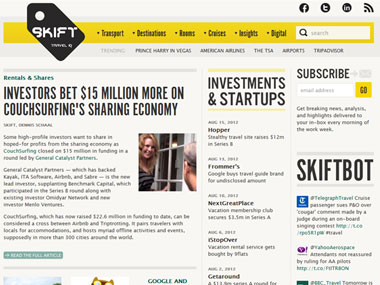If you thought that travel is all about leisure, here’s someone who will elaborately disagree. By categorizing travel into managed and un-managed segments, Rafat Ali, founder of Skift.com , a travel intelligence company is trying to open up a whole new vista for the travel industry. After successfully selling his first venture, Paidcontent (a B2B media vertical, ContentSutra was the India presence) to the Guardian, Rafat’s hoping to create a paradigm shift, yet again.
He spoke to Firstpost over the phone about his new venture, the gaps in the travel Industry and the Indian traveler.
You say skift is for the business traveller, do you think the business traveller really cares so much about the specifics?
There are two broad categories in travel-managed and un-managed travel. Business travel is largely managed while un-managed travel is typically leisure travel. Managed or business travel forms a big part of the industry. We think this is an interesting segment because as internet, mobile and digital come into play, the role of travel agents is getting decimated to a large extent. People are increasingly booking through websites on their own. There are many start-ups focusing on leisure travel but generally people take holidays only about twice a year. In that sense, business travel happens more often and is organised. They are also more loyal to brands, so it makes more business sense.
[caption id=“attachment_427208” align=“alignleft” width=“380”]
 Screengrab of the website[/caption]
Screengrab of the website[/caption]
What are the insights that lead you to model this on the business traveller?
Business travellers have more specific information needs. They like to consider themselves as experts and their obsessive and loyal nature helps push information. We also look to target the other persona of business travelers who also indulge in leisure travel, which helps us cover both these grounds. Another reason for focusing on this segment is that, for advertisers they are a much more addressable bunch and hence we feel that it’s a smarter way to go.
Impact Shorts
More ShortsWhat sort of gaps in the travel industry do you think exist? And how do you think Skift will help bridge those and differentiate from other brands in the industry?
We primarily focus on the US and UK markets and our primary expertise is B2B media. B2B data service for the travel industry is predominantly in the form of magazines. It has not yet made the leap in terms of social media. There is no place which can cater to research, analytics all at once. We are trying to be that B2B, social, mobile brand that the industry deserves. We are saying that we will cut across silos and cover the industry in a big picture way and address the market globally. Most start-ups in travel do either reviews or booking. We do not want to do either. We want to be on top of the industry helping it make smart decisions.
Do you plan to cater to the Indian audience specifically? Is that on the agenda?
The Indian travel market is growing very fast. We are looking to build an office in India which will lend tech and editorial support. Slowly we will also cater to local news. We plan to do information services for India as well. We are taking a step at a time because the aviation industry is so troubled in India.
Do you think the Indian market is global when it comes to travel?
Business travel in India has picked up fast and executives are travelling everywhere. The market is growing as companies are becoming more global as well as global companies coming to India. In terms of leisure travelers, Indians are very different from their global peers. Most of the trips taken by Indian travellers are shopping trips and most of them stick to tourist spots. It is also largely driven by family presence.
Monetising online travel has become synonymous with bookings -what do you have to say about that ?
Bookings is what most companies in India do. Most of them are in the reservation space and they are also opening offline shops. But we are not focused only on that. We want to do news and information, so that’s our big opportunity.
[caption id=“attachment_427842” align=“alignleft” width=“380”]
 Rafat Ali, founder Skift.com. (Second from right)[/caption]
Rafat Ali, founder Skift.com. (Second from right)[/caption]
How do you plan to monetise products/services of Skift?
On the consumer side, we plan to support the news and the editorial content with advertising revenue. When data builds, the information services that are built on data will be on a subscribed basis. We have plans of creating apps and services for business travelers and charge them a premium on these services.
Apart from this, we also plan to organise global industry conferences for travel.
Why place such a premium on news in travel? How does it give Skift an edge?
My background is news. It’s what I know best and honestly it was the lowest hanging fruit. I feel that media is a great way to build a brand and put your name on the map. You become the authority in the industry and it does not cost tons of money.
)